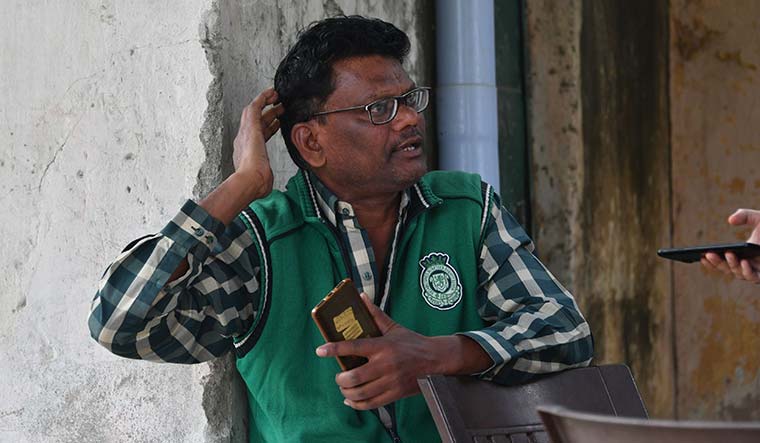EVERYONE KNOWS Ramzan Khan aka Munna Master in Bagru, some 35km from Jaipur. He is particularly liked for his harmonious bhajans every new moon night at the local shrine housed inside a cow shelter. From the cheerful halwai in the main market, robustly splashing milk in a large pot to make a cream dessert, to the barber donning a saffron safa (turban), all are on friendly terms with Munna Master in this Hindu-majority settlement of cloth dyers and printers. “Munna Master was so happy a few days ago when his son Firoze finally got a job in Varanasi. He was anxious for months.... His son will also be famous like his father,” says the confectioner, unaware that Firoze is already in the national limelight. When informed about how his appointment as Sanskrit professor in Banaras Hindu University (BHU) had stirred up protests from a section of students because of his religion, the halwai is quick to dismiss the brouhaha. “He is teaching Sanskrit only. What is the big deal?” he asks. “Not like he has married a Hindu.”
Appointed assistant professor at the faculty of BHU’s Sanskrit Vidya Dharma Vijnan Sankaya on November 5, Firoze was seen as the most accomplished hire for the department. Firoze, a student of Sanskrit since class two, completed his ‘shastri’ (bachelor’s), ‘shiksha shastri’ (BEd), ‘acharya’ (master’s) and PhD in the language from Rashtriya Sanskrit Sansthan in Jaipur. He also cleared the National Eligibility Test for Junior Research Fellowship.
Like his father—also a Sanskrit graduate—Firoze can compose and sing bhajans. His grandfather, Gafur Khan, also livened up kirtans with devotional songs. Nobody in Bagru thinks there is anything amiss about a Muslim mastering the “sanctified” liturgical language of Hindu Brahmins. His school, Rajkiya Varishtha Upadhyay Sanskrit Vidyalaya, located right next to a pink-walled mosque, still recalls Firoze as a model student. Yet, it seems one can only go so far in accepting syncretic ethos when you hear voices reinforcing old, negative patterns of disharmony, overlooking centuries of Ganga-Jamuni tehzeeb (a fusion of Hindu and Muslim cultural elements). Rakesh Agarwal, who teaches Sanskrit and English in the same school, thinks Firoze is merely book smart and that singing bhajans extolling Krishna might as well be his hobby. “The faculty for which he was initially appointed has sections like Dharmashastra and Dharmagam. How can a Muslim perform all the activities and rituals associated with these disciplines?” he asks, just when the school principal and Firoze’s teacher are out of earshot. “It is okay to stick to Sanskrit literature and language, but what about practicals? Will he wear the sacred thread? Will he wear a shikha (top knot) on his head like an orthodox Hindu? Can he drink cow’s urine? I have heard these arguments on news channels and they have merit.”
Many have spoken in Firoze’s favour, including the staff at the faculty, the chief proctor and vice-chancellor of BHU and even BJP MPs and the RSS. But Firoze’s family has been chilled into silence over the controversy. The house wears a forlorn look and the family stays shut in, wary of media attention. Some media reports state that Firoze’s family follows the Sanatana dharma. His younger brother Waris seems stumped on hearing this. “The media people end up writing anything,” says the 27-year-old who studied Sanskrit till class 12 and will appear for a stenography exam. “We just want to live peacefully with our Hindu neighbours. Besides, what is Sanatana dharma? Anything that binds people together. Everybody follows it. My brother and father sing bhajans as well as filmi songs. We have been singing for generations. We have the talent and this has been our profession.” Muslims comprise 30 per cent of Bagru’s population, and Waris says he has never seen any communal flare-up here. But he is still afraid to comment on the matter. “We have to coexist here, you know,” he says.
Away from Rajasthan, in Salbari village of West Bengal’s Jalpaiguri district, Ramzan Ali, now 34, discovered Sanskrit in class seven. He was particularly charmed by the subhashitani shlokas—wise sayings—from the Vedic scriptures. His father, a stonemason, would repeat after his son as he read aloud from his Sanskrit textbooks: “The cycle of joy and sorrow keeps turning. This is how it is going to be and you have to keep fighting.”
When his father died, these moral lessons kept Ramzan going. He did his postgraduation in Sanskrit, achieving first class marks despite the financial constraints in his early years. He and his three brothers would accompany their mother, Noor Jahan Begum, for domestic work in neighbouring houses that offered rice and leftover food for lunch. Dinner was usually hard to procure. Ramzan would also do odd jobs like selling cattle feed, cow dung and betel nuts, saving every penny for his brothers’ education. And, he kept mastering Sanskrit, constantly egged on by his Hindu teachers. Often his high school admission forms would get cancelled, with the signing authority asking him, “Now you want to conduct pujas after studying Sanskrit?”, or telling him to study geography instead as he had higher marks in the subject. But Ramzan persisted.
On November 13, the Ramakrishna Mission Vidyamandira at Belur near Howrah appointed Ramzan as assistant professor in its Sanskrit department, just when Firoze was prevented from teaching at BHU. But no student or faculty member at the Belur college has protested so far. Ramzan, who now earns a salary of 052,000, cannot understand the fuss over Firoze’s appointment. “It is not like the rituals are conducted by ordinary Hindus. They also require specialised priests,” he tells THE WEEK over the phone. “We are Indians first and Indian culture resides in Sanskrit. The country needs to know the ancient scientific and technical literature, morality and ethical values. Anyone from any caste or religion can read Sanskrit and achieve success like me.”



